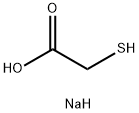2,3-Dimercapto-1-propanol , 10mMinDMSO , 59-52-9
Synonym(s):
DMP;Dimercaprol;BAL;2,3-Dimercapto-1-propanol;B Aggressive lymphoma protein
CAS NO.:59-52-9
Empirical Formula: C3H8OS2
Molecular Weight: 124.22
MDL number: MFCD00004864
EINECS: 200-433-7
| Pack Size | Price | Stock | Quantity |
| 1ml | RMB159.20 | In Stock |
|
| others | Enquire |
PRODUCT Properties
| Melting point: | 77 °C |
| Boiling point: | 120 °C15 mm Hg(lit.) |
| Density | 1.239 g/mL at 25 °C(lit.) |
| vapor density | 4.3 |
| vapor pressure | 7.4 hPa (100 °C) |
| refractive index | n |
| Flash point: | >230 °F |
| storage temp. | Store at +2°C to +8°C. |
| solubility | 87g/l (slow decomposition) |
| pka | 9.00±0.25(Predicted) |
| form | Liquid |
| color | Clear colorless to slightly yellow |
| PH | 5.0-6.5 (H2O, 20℃)(saturated solution) |
| Odor | pungent odor |
| biological source | rabbit |
| Water Solubility | 87 g/L (25 ºC) |
| Sensitive | Air Sensitive |
| Merck | 14,3209 |
| BRN | 1732058 |
| Stability: | Stable. Combustible. Incompatible with strong oxidizing agents, many metals. |
| CAS DataBase Reference | 59-52-9(CAS DataBase Reference) |
| NIST Chemistry Reference | Dimercaprol(59-52-9) |
| EPA Substance Registry System | 2,3-Dimercaptopropanol (59-52-9) |
Description and Uses
Dimercaprol (INN) or British anti - Lewisite (abbreviated BAL), is a compound developed by British biochemists at Oxford University during World War II . It was developed secretly as an antidote for lewisite, the now - obsolete arsenic - based chemical warfare agent . Today, it is used medically in treatment of arsenic, mercury , gold, lead, antimony, and other toxic metal poisoning . In addition , it has in the past been used for the treatment of Wilson's disease, a genetic disorder in which the body tends to retain copper.
2,3-Dimercapto-1-propanol has been used in synthesizing novel (2-substituted phenyl-1,3-dithiolan-4-yl) methanol (PDTM) derivatives, which are potent tyrosinase inhibitors. It can also be considered for developing new drugs against AIDS due to its ability to inhibit HIV-1 tat activity.
Safety
| Symbol(GHS) |  GHS06 |
| Signal word | Danger |
| Hazard statements | H301-H315-H319-H335 |
| Precautionary statements | P301+P310+P330-P302+P352-P305+P351+P338 |
| Hazard Codes | Xn,Xi |
| Risk Statements | 22-36/37/38-36/38 |
| Safety Statements | 26-36-24/25-23 |
| RIDADR | UN 2810 6.1/PG 3 |
| WGK Germany | 3 |
| RTECS | UB2625000 |
| F | 8-9-13-23 |
| TSCA | Yes |
| HazardClass | 6.1 |
| PackingGroup | III |
| HS Code | 29309070 |
| Hazardous Substances Data | 59-52-9(Hazardous Substances Data) |
| Toxicity | LD50 i.m. in rats: 86.7 mg/kg (Zvirblis, Ellin) |




